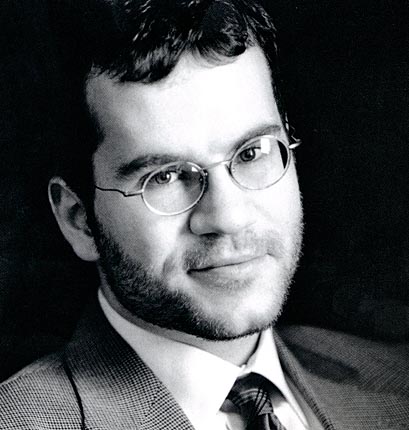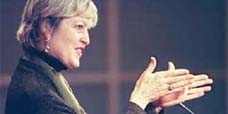
"The great nonfiction writer Lawrence Weschler once said to me that there are two kinds of nonfiction writers: Those who basically accept the idea that some type of fictionalizing almost always occurs in narrative nonfiction and those who cannot accept this idea. I am of the former camp. " Author Tom Bissell served as a Peace Corps Volunteer in Uzbekistan.
Tom Bissell explores the notion of truth in travel literature, from Robert Byron’s “The Road to Oxiana” to his own book, “Chasing the Sea”
Truth in Oxiana
James Frey’s “A Million Little Pieces” sparked a national debate about the rules of nonfiction. Here, Tom Bissell explores the notion of truth in travel literature, from Robert Byron’s “The Road to Oxiana” to his own book, “Chasing the Sea.”
Preface
This essay, about the inevitability of fictionalizing in some forms of nonfiction, began as a lecture I gave to Bennington College’s low-residency MFA students in early 2004. I intended to provoke a response and did not get much of one beyond some friendly congratulations. Sven Birkerts, editor of the journal Agni, was among the audience to whom I gave the lecture, and afterwards offered to publish a version of it. I retooled the piece somewhat for publication, hoping to get a response. Again, I was told by those who read the essay that they enjoyed it. And that, more or less, was it. Now that James Frey’s exaggerations and distortions in his memoir A Million Little Pieces have traumatized Oprah Winfrey, scandalized the American reading public, and become the most recent benchmark of nonfiction-writing wickedness, the editors have asked to republish my essay here on World Hum, to which I have contributed before.
The great nonfiction writer Lawrence Weschler once said to me that there are two kinds of nonfiction writers: Those who basically accept the idea that some type of fictionalizing almost always occurs in narrative nonfiction and those who cannot accept this idea. I am of the former camp. That said, what Frey did is clearly beyond the pale. I have not read “A Million Little Pieces.” Frey’s early interviews, wherein he enthusiastically and ignorantly trashed every young male writer he understood himself to be competing against, were so unappetizing I decided that his was a mind with which I had no interest in seeking communion. Yet while watching Frey slink into the slaughterhouse during his now infamous “Oprah” appearance I could not help but feel some nagging sympathy for him. It seemed to me that the ad hoc vocabularies Frey’s various attackers kept resorting to seemed as wide of the mark as Frey’s own distortions were from reality. “The truth,” for instance, kept being addressed as though this were something we all implicitly agreed upon and understood and valued, like the flag. Frey was guilty of distorting and eliding the facts of his life, but the truth of his life, whatever that could be, and how he sought to communicate it, seemed to me another question altogether, and not one for strangers to judge so confidently. What was most grievously lost in the discussion was any acknowledgment at all that many beloved classics of nonfiction took as many liberties with the facts as Frey did, and yet the sky somehow stayed in its place and wider notions of the truth remained intact. We seem to have become a culture that begs to be lied to, and which then viciously turns on the liar for giving us exactly what we want. I do, however, remain confident that if Frey’s book is still being read 50—or even five—years from now, much of this tempest in a cathode tube will seem curiously beside the point, even though I suspect that Frey’s career as a nonfiction writer is essentially over.
I was a bit slippery with the facts myself a few paragraphs ago. I wrote that my lecture did not get much of a rise out of my audience. In fact, one earnest nonfiction-writing student—a professional journalist in his other life—took me aside to ask that if I really believed one could fictionalize a little in nonfiction, where did one stop? I have long regarded the slippery-slope argument as a rhetorical desperation move, but nevertheless told the young journalist that one stopped at the same place one stopped when arguing with someone, for one did not often knock out someone’s teeth over an honest disagreement. The line between arguing and physical confrontation is, for most people, clear and obvious. Just as, I said, the line between what is acceptable and unacceptable in nonfiction writing is clear and obvious. This did not at all satisfy the journalist, and now I have to admit that the Frey imbroglio has made me somewhat less confident in the clarity of this line’s placement. I should also say that nothing I have written below should be understood as advocating turning a few hours in the drunk tank into a three-month jail time odyssey, nor of creating relationships where none existed. Frey’s great mistake, it seems to me, was wrapping around his story the banner of truth itself, only to learn that the banner was, in fact, a noose. In the end, I suspect that very few explicitly autobiographical narratives could withstand the close reading the likes of which The Smoking Gun gave “A Million Little Pieces.” This does not make the authors of those narratives liars; it makes them servants of fallible human memory and perception. I would like to believe it was the enormity, and excessive self-aggrandizement, of Frey’s distortions that have earned him his just desserts, and that, the next time a writer is nabbed for similar liberties, distinctions will be made. But I doubt it. If, as the maxim goes, we learn the truth by comparing the lies, there we stand, liars all.
[Excerpt]
I will now make a confession. There is a playlet in my book, Chasing the Sea, which is of course my own small homage to Robert Byron. It stars me, my translator Rustam, a Peace Corps volunteer named Rick, and a guide named Faruza, and it takes place during our tour of a fortress in the Uzbek city of Bukhara. It, too, is “made up.” That is, it is made up of the various phrases I had scribbled down during our tour, various sentences I swiped from Bukhara’s vigorously ungrammatical English-language tourist’s guide, and various memories I had of our conversations while being escorted around the fortress. I hoped to provide a sense of Faruza, a woman with whom I spent two hours, and I hoped to provide a sense of the kinds of sentiment to which an outsider is treated while visiting Bukhara’s ancient sites. Above all I hoped to be honest, and I hoped for the passage to ring true. But I was writing about it almost a year after visiting Bukhara, and my notes, while thorough, were not a time machine. I had a few choices, then: not write about it, write about it while imperfectly dining on the Swiss cheese of memory, or write about it in a way that would incorporate numerous imprecise memories and jotted notes and hijacked third sources and hope that it still felt like what I had experienced. I chose that third path, and I did so without hesitation. So my playlet is “made up.” It is also, in every important sense, true, and I stand by it with clear conscience.
I should quickly—probably very quickly—point out that there are other passages in “Chasing the Sea,” like “The Road to Oxiana,” that come from more thorough notes, that incorporate actual, painstakingly transcribed conversations, and use very little artifice in describing real events. These scenes always involve named, identifiable people and historical events. The sword-bearing guardians of journalistic and literary truth stand implacably above such matters for a reason: lying about history and messing with people’s lives and their trust in you as a writer is immoral—doubly immoral, for once something is in print, the lie is permanent. Some might argue that by inventing long comic dialogues, Byron was wreaking havoc on the truth. Or that I, in inventing dialogue for Faruza (not her real name, incidentally), am swimming in equally dangerous literary waters. What I would argue is this: representing the truth in nonfiction is not an issue of conveyor-belt simplicity, where widgets of identical consequence float mechanically by. It is a case-by-case matter in which the heart figures as much as the brain.
Think about even the most basic task in nonfiction: You are trying to describe someone you once met. In your memory he is wearing cowboy boots, blue jeans, an Oklahoma-shaped belt buckle, a redcheckered shirt, a sweaty blue bandana loosely tied around his neck, Oakley sunglasses, a huge leather cowboy hat, and an earring, a gold one, in his left ear. He also has unusually small hands, with mangled cuticles. In fact, his thumb is bleeding right now. He has something of an acne problem, especially around the mouth, and on his cheekbone, just visible beneath the lower edge of his Oakleys, lurks the distinct dermal memory of a black eye. After a moment, you realize he must have recently stepped in a mound of cow manure, for the rich, barnyardy scent of fresh dung hovers around him. You also note that he’s shaven himself, badly—a centimeter-wide line of unmown stubble streaks along his jawline. And, in your memory, he is smiling. So, then, where to begin? What to mention? What not to mention? This is the sort of scenario nonfiction writers confront all the time; it is a variation on the problem Byron undoubtedly faced in writing “The Road to Oxiana”’s comic dialogues, and the problem I occasionally faced in “Chasing the Sea”: what is representative, and what is not? If you write only of our imaginary cowboy’s smell of cow dung and badly shaven face, you have a distasteful rube. If you mention only the black eye and sunglasses, you have a brawler. Mention that smile, and you have a charming brawler. Mention it all and you are in grave danger of overloading your reader’s (and editor’s) patience. The selection of detail in nonfiction can be grossly unrepresentative even when it is factually accurate, and can be qualitatively more unfair and less honest than Robert Byron’s invented comic dialogues, which, let us be sure, were based on something. The selection of detail in nonfiction can also be uniquely illuminating. As a writer, you have to rely on your own spiritual generosity to fairly and accurately represent the defenseless human being at the other end of your words. Writing nonfiction forces a writer into the same kinds of questions fiction writers ask themselves, questions of economy and honesty and poetic accuracy, and the decisions they make can either inform or destroy the reader’s trust. What makes the question so complicated for nonfiction writers is that they cannot modify or invent in the same way fiction writers can and do with no fear of moral reprisal. Nonfiction writers have to work with what they have; they have to find freedom in a cage. This is not to argue that fiction writing is easier than nonfiction writing; I personally find fiction writing far more difficult because I do not have at my disposal the same kinds of vivid detail. Selecting the right details can be difficult, but inventing them from whole cloth is often a nightmare. I attribute this to the scary infinity of human choice.





















